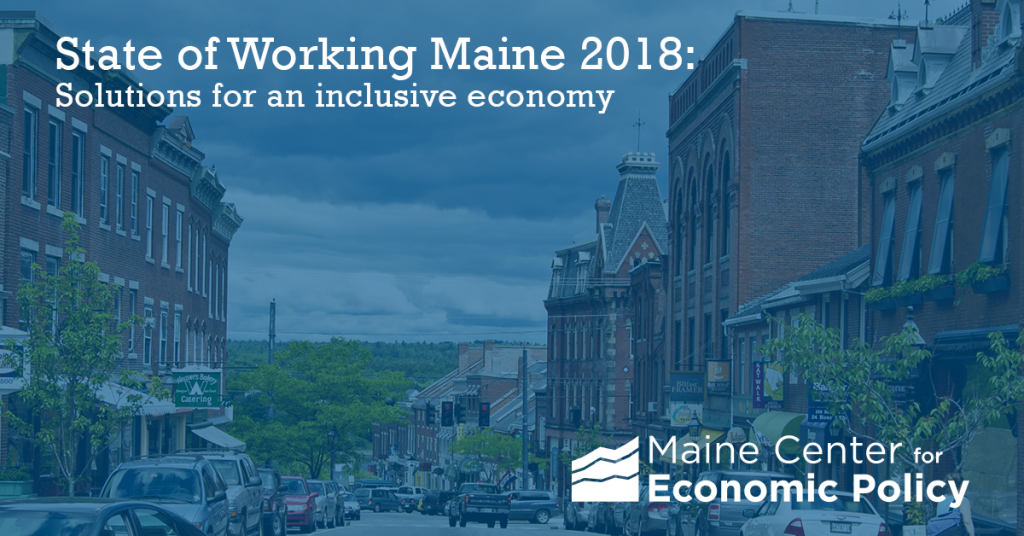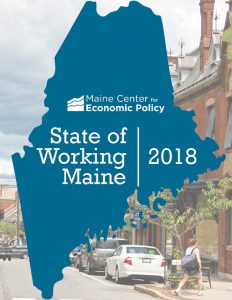
Too many jobs pay too little, are too unpredictable and don’t support Mainers’ well-being. With smart policy changes, we can turn all jobs into good jobs
AUGUSTA, Maine — Despite low unemployment and economic growth, too many Mainers are being left behind because available jobs don’t support workers’ ability to share in a strong economy.
 State of Working Maine 2018, a new report by the Maine Center for Economic Policy, examines the quality of jobs in Maine and offers policy prescriptions to assure that a rising economic tide truly lifts all boats.
State of Working Maine 2018, a new report by the Maine Center for Economic Policy, examines the quality of jobs in Maine and offers policy prescriptions to assure that a rising economic tide truly lifts all boats.
“Mainers are working hard and playing by the rules, but many still struggling to provide for their families in today’s economy. We can address that by ensuring that the rules and practices around work reflect Mainers’ values of fairness and dignity in the workplace,” said MECEP Executive Director Garrett Martin.
“Too many Maine workers are subjected to jobs that offer low pay, unstable work schedules and lack even a single paid sick day. A large number of workers are also denied overtime pay when they work long hours,” Martin said. “Our economy is stronger when all working Mainers can afford the basics, take care of their families and save for the future. Policymakers, employers and workers all have a role to play in structuring the rules of our economy so that all Mainers can get ahead in a strong economy.”
While State of Working Maine 2018 includes six chapters of research and analysis regarding job quality in our state, the report is geared toward policy solutions that will make good jobs the norm in Maine. Key policy recommendations include (click headers to access the relevant chapter in our report):
- Solutions for a livable income: A clear indicator of a job’s quality is the income it provides. With more than one-third of Maine households earning less than a livable income and many salaried workers — including those with low wages — ineligible for overtime pay, more must be done to ensure families can afford the basics, weather emergencies and plan for the future. Continued increases to the minimum wage, guaranteed equal pay across race and gender lines, and expanded access to overtime pay for more Maine workers will ensure that jobs pay good wages to hardworking Mainers.
- Solutions for job stability: Mainers are more likely than other Americans to work in part-time and/or seasonal jobs, while scheduling volatility leads to erratic incomes that deny Mainers the security of knowing they’ll make ends meet. Guaranteed fair scheduling and decreased barriers to programs that stabilize families, such as unemployment and food assistance, will go a long way to providing employment stability and predictability to Mainers’ lives.
- Solutions for Mainers’ well-being: A healthy workforce is a productive workforce. But the inability for many workers to take even a single day of paid sick leave results in Mainers losing $115 million in wages every year. The lack of paid family and medical leave puts workers, particularly working women, in the difficult position of choosing between their livelihoods and the care of their families, and contributes to worse outcomes for children and families. Universal paid sick leave and universal paid family and medical leave will improve economic and health outcomes for Maine families.
- Solutions for a dignified retirement: The median Social Security payment in Maine provides little more than a subsistence income to seniors. Still, nearly one in three working seniors has no retirement savings or plan other than Social Security, and persistent gender and racial pay inequity means women and people of color are less likely to have secure retirement than white men. By strengthening Social Security and implementing a state supplement to Social Security benefits, Mainers can guarantee that workers who pay into the system their whole lives have access to a stable, comfortable retirement.
- Solutions to reduce discrimination: Mainers with a history of incarceration, the long-term unemployed and workers suffering mental health issues all face unique barriers to fully participating in our economy. Rehabilitation certificates, a reduced role for criminal background checks in job applications and a system to expunge outdated criminal records will give Mainers who have served their time a chance to reintegrate with society. Expansions of supported employment and increased funding for job training will help make sure everyone has a chance to succeed in a growing economy.
- Solutions to give workers a voice: Strong unions are associated with better wages and benefits, safer working conditions and less discrimination, but it’s become harder for workers to exercise their freedom of association and organize unions. Increased penalties for employers who suppress workers’ right to organize, the creation of wage boards and reforms to modernize federal labor laws will restore workers’ constitutional rights and improve economic conditions for union members and nonmembers alike.
Click here to obtain an executive summary of State of Working Maine 2018. Click here to obtain the full report. A summary of policy solutions is available here.
###


